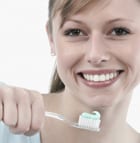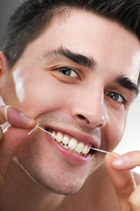 Once it has become part of your daily routine you shouldn’t have to even think very much about how you take care of your teeth. But there are certain things that should be put into practice so that your standards of oral hygiene are the highest they can possibly be. If you are having trouble with any of these things or are worried about your oral health then you should make a point of talking to your local dentist in the Leeds area.
Once it has become part of your daily routine you shouldn’t have to even think very much about how you take care of your teeth. But there are certain things that should be put into practice so that your standards of oral hygiene are the highest they can possibly be. If you are having trouble with any of these things or are worried about your oral health then you should make a point of talking to your local dentist in the Leeds area.
When considering your oral hygiene it is important to remember the aims of dental care, why we look after our teeth and what we hope to achieve in the process. The greatest enemy to good oral hygiene is the effects of plaque. Plaque is an acidic substance that is formed in the mouth after the consumption of food and drink. Those containing high quantities of sugar and or starch are the biggest culprits. Plaque cannot be entirely avoided, even with a careful diet, but it can be successfully removed from the mouth.
This is why the removal of plaque takes centre stage for oral hygiene and the most important two things to do are to brush teeth and then floss in between them. Brushing should be done first thing in the morning and last thing at night and after meals or snacks if you feel the need. Use a tooth brush that is comfortable in your hand and apply tooth paste containing enamel-enhancing fluoride.
Make sure that you go and see your dentist every six months too so that your teeth and gums can be monitored and problems can be solved quickly.





 If you have lost a tooth or teeth, you will have to get them replaced otherwise your mouth will not function as well as it should. The only decision is which method you will choose to do so and here you will have a degree of choice. Large scale tooth loss is commonly solved with dentures which come in full or partial sets. An affordable option for single tooth loss that relies on the health of surrounding teeth is dental bridge work. Many people though are opting for dental implants and the process has a number of advantages.
If you have lost a tooth or teeth, you will have to get them replaced otherwise your mouth will not function as well as it should. The only decision is which method you will choose to do so and here you will have a degree of choice. Large scale tooth loss is commonly solved with dentures which come in full or partial sets. An affordable option for single tooth loss that relies on the health of surrounding teeth is dental bridge work. Many people though are opting for dental implants and the process has a number of advantages. Given that periodontal disease can, in extreme cases, result in the loss of teeth, dentists agree that it is best to avoid it rather than to deal with the consequences. Periodontal disease is disease of the gums and it has a set of easy to understand causes and, as such, measures that we can all take to prevent it in the first place.
Given that periodontal disease can, in extreme cases, result in the loss of teeth, dentists agree that it is best to avoid it rather than to deal with the consequences. Periodontal disease is disease of the gums and it has a set of easy to understand causes and, as such, measures that we can all take to prevent it in the first place. There is little that can be done about the gradual accumulation of stains on teeth and the dulling of their colour over time. As we get older teeth tend to lose their youthful sheen and this is compounded by things such as drinking tea, coffee or red wine which have a cumulative staining effect on teeth. What can be done however, is stain removal and you should ask your dentist about these processes if you are tired of your stained and dull smile and want to have a set of youthful, white teeth again.
There is little that can be done about the gradual accumulation of stains on teeth and the dulling of their colour over time. As we get older teeth tend to lose their youthful sheen and this is compounded by things such as drinking tea, coffee or red wine which have a cumulative staining effect on teeth. What can be done however, is stain removal and you should ask your dentist about these processes if you are tired of your stained and dull smile and want to have a set of youthful, white teeth again. The oral health of children relies on the application of much the same principles as does the oral health of adults. The difference is that, if you have children, their oral health is your responsibility because they are in your care. As such, you will need to monitor it to make sure that their teeth are taken care of and they are not developing problems with their mouth that will be an issue for the rest of their lives.
The oral health of children relies on the application of much the same principles as does the oral health of adults. The difference is that, if you have children, their oral health is your responsibility because they are in your care. As such, you will need to monitor it to make sure that their teeth are taken care of and they are not developing problems with their mouth that will be an issue for the rest of their lives. There are a number of things that only your dentist can do at his or her surgery. Procedures like root canal treatment and the fitting of braces are obvious but dentists can also contribute to the cleaning of teeth by using a special process that can only be carried out at the surgery. It is called scaling and polishing and it leaves you with that ‘dentist clean’ feeling in your mouth.
There are a number of things that only your dentist can do at his or her surgery. Procedures like root canal treatment and the fitting of braces are obvious but dentists can also contribute to the cleaning of teeth by using a special process that can only be carried out at the surgery. It is called scaling and polishing and it leaves you with that ‘dentist clean’ feeling in your mouth. Bad breath is clinically known as halitosis and is something that most of us have had to put up with in small doses every now and then. Eating dishes that are heavy on the garlic leaves the smell of garlic lingering in the mouth for some time and coffee tends to affect the odour of breath. Many people first thing in the morning find that their breath does not smell fragrant then either. But for some people the problem is more chronic than just occasionally having unpleasant breath.
Bad breath is clinically known as halitosis and is something that most of us have had to put up with in small doses every now and then. Eating dishes that are heavy on the garlic leaves the smell of garlic lingering in the mouth for some time and coffee tends to affect the odour of breath. Many people first thing in the morning find that their breath does not smell fragrant then either. But for some people the problem is more chronic than just occasionally having unpleasant breath. If you have not flossed before then you are missing out on the benefits that this simple activity will convey on the health of your mouth. The high rates of gum disease in the United Kingdom are perhaps evidence that too few people are flossing or are flossing irregularly or not in the right way. If you are unsure about how you should floss and why then talk to your dentist. This article has the basic information.
If you have not flossed before then you are missing out on the benefits that this simple activity will convey on the health of your mouth. The high rates of gum disease in the United Kingdom are perhaps evidence that too few people are flossing or are flossing irregularly or not in the right way. If you are unsure about how you should floss and why then talk to your dentist. This article has the basic information.

